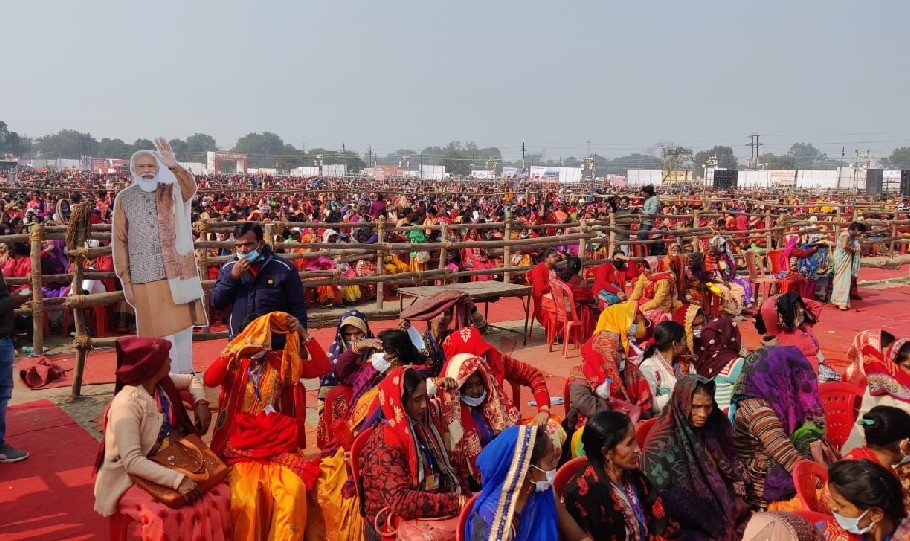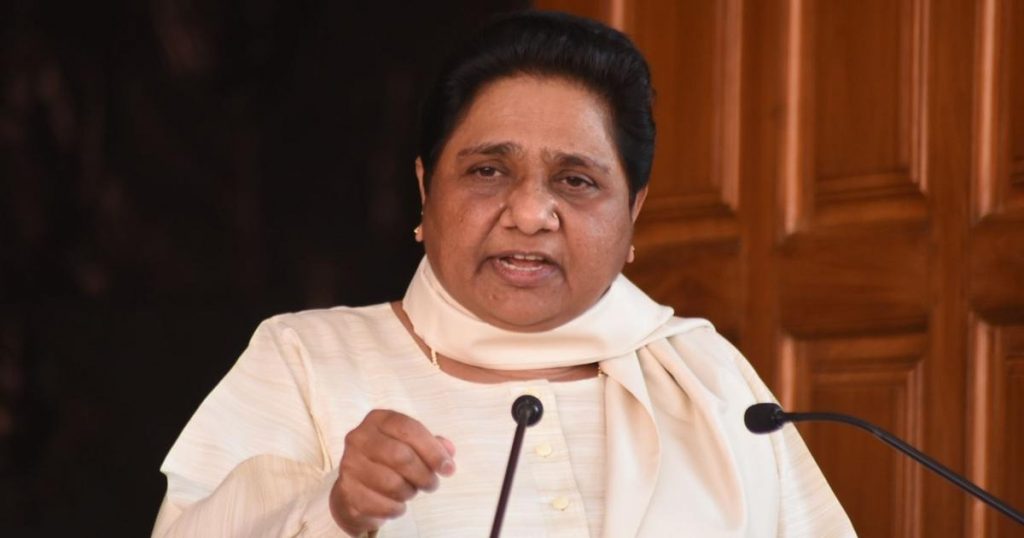
Will Mayawati derail SP-RLD hopes of sweep in western UP, help BJP?

By late this evening, Akhilesh Yadav’s Samajwadi Party and Jayant Chaudhary’s Rashtriya Lok Dal (RLD) would, predictably, be assessing with nervous optimism the victory prospects of their candidates across the 58 seats in western UP, where polling for the first phase of the Assembly polls is underway today (February 10).
The SP-led rainbow alliance of over half a dozen parties has unanimously been tipped as the principal challenger to the ruling BJP in UP. For the alliance, much of the arithmetic for wresting power hinges on how well the RLD and the SP perform in these 58 seats, or the two-dozen remaining west UP constituencies that go to polls in the second phase on Feb 14. Other constituents of the Yadav-led coalition such as OP Rajbhar’s SBSP, Keshav Dev Maurya’s Mahan Dal and Krishna Patel’s Apna Dal have no stakes here.
Long before Yadav and Chaudhary even sat down to finalise their seat-sharing formula, it was believed that the anger against the BJP among this region’s predominantly agrarian community that had been at the vanguard of the 15-month long agitation over the now repealed farm laws would help the SP-RLD combine take massive lead against the saffron party in west UP.
The concentration of Jats (between 35-40 per cent of the population on many of these 58 seats) and Muslims (estimated to be about 24 per cent here) strengthened this perception as the RLD had spent many months trying to win back its Jat vote that had decisively switched to the BJP since 2014, while the SP was pegged as the default choice of the Muslim electorate in this election season.
These seats also have a strong presence of non-Yadav backward castes, which too the SP had been wooing aggressively through induction of prominent community leaders, including those who won the 2017 Assembly polls on a BJP ticket.
A back-of-the-envelope calculation should have, thus, given a comfortable caste-based vote bank to the SP-RLD alliance to be buoyant of its victory here. Despite Union Home Minister Amit Shah’s whirlwind door-to-door campaign in several of these seats, the BJP’s refusal to engage with the angry farming community or appease it through populist announcements in the recently presented Union Budget too gave the impression that the party wasn’t hopeful of regaining lost ground in this belt that had voted overwhelmingly for its candidates in 2017.
Also read: Will reverberations of hijab controversy be felt in poll-bound UP?
However, most commentaries on the likely vote consolidation in these 58 seats seem to have made a crucial omission – that of the prospects of the Bahujan Samaj Party; ostensibly because it’s supremo, Mayawati, had been invisible from the poll campaign trail for long. And yet, over the past week, particularly since February 2, when Mayawati addressed her first rally of this poll season in Agra, there seems to have been an electoral churn in these seats, as well as in many of the 55 other constituencies that will go to polls on February 14, that may hurt the SP-RLD alliance way more than it had anticipated.
The 76 constituencies that fall in the vaguely defined geographical dimensions of western UP (other estimates notch up the seat tally beyond 100 by adding a few more districts), are invariably referred to as the state’s ‘Jatland’, where the Jat community plays a key role in determining which party bags the maximum seats. The impression, though, is neither wholly unfounded not entirely accurate.
The Jats can sway the results in constituencies that fall under districts such as Mathura, Baghpat, Muzaffarnagar, Meerut, Shamli and others. However, as the past UP elections have repeatedly shown, for any party to perform well in the region, or substantially dent a rival’s prospects, several other caste-combinations, including those that don’t require Jat consolidation, are also available.
This is where Mayawati steps in to upset the aspirations of the SP-RLD; and, arguably, to bring some cheer to the BJP.

The west UP districts have large pockets of Dalit votes; primarily those of the Jatavs – Mayawati’s community that is largely believed to stand by her irrespective of the state-wide prospects of her party.
“There are different combinations that have worked in west UP in the past for different parties that have ultimately formed a government in UP. In 2007, when Mayawati surprised everyone by winning an absolute majority, she had swept west UP through a Dalit-Muslim-non-Yadav OBC consolidation, while Brahmins added to this consolidation in other regions of the state. In 2012, SP did well in west UP by bringing together Muslims and OBCs, but Mayawati still performed better in this region and got 30 seats here because Yadav couldn’t break away Dalit votes or win Jat votes. In 2017, BJP got almost 75 percent Jat votes and broke away a huge chunk of non-Yadav OBCs and non-Jatav Dalits from SP and BSP respectively. This time, the Jatavs will vote as per Mayawati’s directions and Yadav has made a blunder by under-estimating the damage Mayawati can do,” Dalit-rights activist Ram Kumar told The Federal.
Also read: In Western UP, how Muslim votes help swing the fortune of parties
Many workers of the SP-RLD combine that The Federal spoke to in the Meerut-Khatauli-Muzaffarnagar belt alleged that though the alliance is expected to perform well, the BJP is “using Mayawati as its proxy” and that the “BSP has fielded candidates in a way that will cause maximum damage to our candidates”.
For a better part of the past few months, while the SP-led alliance, the BJP and even the Congress were aggressively campaigning across UP, Mayawati had been conspicuous by her absence. It was only on February 2, eight days before polling for the first phase of UP elections, that Mayawati addressed her first rally in Agra.
In her trademark style, the BSP supremo read out her speech, but it escaped none that her most acerbic attacks were reserved for the SP and not the ruling BJP, which it criticised only once in her entire address on count of rising crimes and bad governance. In Agra, and in subsequent rallies she has addressed since, Mayawati accused SP of being an “anti-Dalit” party and even charged it for “crimes” that, in fact, were not committed by Yadav or his government. She accused SP of changing names of places she, during her CM tenure, had named after Dalit icons.
Likewise, Mayawati criticised the Congress strongly for not giving Bharat Ratna to Dr. B.R. Ambedkar and not announcing a national mourning on the demise of her mentor and BSP founder Kanshi Ram. The BSP chief’s criticism of the Congress, though not new, comes at a time when Priyanka Gandhi Vadra, unlike Yadav, has been aggressively wooing Dalits.
Mayawati’s strident attacks against the SP and the Congress and her subdued, nearly absent, criticism of the BJP is being viewed by staunch BSP supporters in west UP through a peculiar prism that unwittingly endorses the fears of SP-RLD workers.
In Charthawal Assembly segment of Muzaffarnagar, where the SP’s Pankaj Malik is pitted against the BJP’s Sapna Kashyap, Chheti Das, a Jatav and “kattar Behenji samarthak” (staunch supporter of Behenji; the widely used moniker for Mayawati), told The Federal, “there may be a wave for RLD-SP, but Akhilesh is anti-Dalit; I will vote for the BSP (candidate Salman Saeed)”. Das conceded that the “BSP will not form the government” but said he is “willing to waste my vote for Behenji… Dalit virodhi ko toh nahi denge (will not vote for anti-Dalits)”.
Raghvendra Chaudhary, a RLD supporter in Raipur Nangal village of Khatauli constituency, told The Federal that though he is confident of the SP-RLD alliance winning the election, he suspects that the BSP has had “a deal” with the BJP to “prevent Akhilesh from becoming CM”. He said, “Behenji has nothing against Jayant Chaudhary, so in seats like Khatauli where the fight is between BJP and RLD, BSP voters will vote for candidates of their party but in seats where SP has a candidate and the BSP doesn’t have a strong nominee, Behenji is getting her votes transferred to the BJP”.
This assertion by Chaudhary is heard in several pockets of west UP. In Budhana, a local BSP worker, who requested anonymity, told The Federal, “there are several areas where we don’t have a good candidate; BSP is also not very strong right now to win the election… Behenji has already hinted that the real enemy is the SP so wherever there is a SP-BJP-BSP fight and our party has a weak candidate, our people will vote for the BJP… This happened in 2017 also.”
Ravi Kant Chandan, a Dalit activist, writer and professor at Lucknow University, told The Federal that Mayawati’s “only goal is to keep the SP out… Because of various political and personal reasons, she is repeatedly calling Akhilesh anti-Dalit, but not criticising the BJP… Not just in western UP, but in other parts of the state too, Mayawati has fielded candidates with a clear strategy to cut into votes of the SP-alliance. In western UP, every third BSP candidate is a Muslim; the aim is to prevent SP from consolidating this vote”.
Chandan, however, also said that Akhilesh had “committed a blunder by making no effort to win over the Dalits, except some communities like the Pasis… The BJP still has influence over some smaller Dalit communities and the Jatavs are still with Mayawati… Mayawati will use this as leverage to get favourable terms from the BJP in return for ensuring that if she can’t win, she will transfer her votes to BJP and prevent the SP-alliance from winning.”
A SP candidate from one of the 58 poll-bound seats seconds Chandan’s claim and also adds that the alliance may have still had a “real chance” at winning the election “if it had ensured that the Jat-Muslim-OBC vote did not split.”
The Jats, the candidate said, are rallying behind the alliance because of anger in this agrarian community over the BJP’s handling of the farmer agitation and also due to sympathy for Jayant over the demise of his father, former Union minister Ajit Singh, who succumbed to COVID-19 last May.
Also read: 2022 UP Polls: Why a Muslim-dominated village is rooting for Yogi over Akhilesh
Ajit Singh was the son of former Prime Minister Chaudhary Charan Singh, the first non-Congress CM of UP back in 1967 and, undoubtedly, the tallest Jat leader of his time.
Despite this though, the SP leader says, “the vote isn’t coming to us en bloc as the BJP has been able to project Jat faces like Sangeet Som and Sanjeev Balyan by polarizing the community against the Muslims ever since the 2013 Muzaffarnagar riots… A chunk of Jats will still vote for BJP as will several OBCs… The anti-BJP vote may split many ways and eventually benefit the BJP. This isn’t as simple an election as it was being made out to be.”


